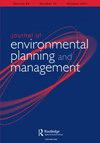烟花庆典和空气污染:来自中国农历新年的证据
IF 3.6
4区 经济学
Q1 DEVELOPMENT STUDIES
Journal of Environmental Planning and Management
Pub Date : 2023-10-24
DOI:10.1080/09640568.2023.2268268
引用次数: 0
摘要
摘要在许多文化中,烟花是庆祝活动中不可或缺的一部分。然而,它们的环境后果引起了人们的关注。尽管许多研究解决了这个问题,但仍然缺乏强有力的因果推理。本研究利用2015年至2017年中国335个城市的数据,调查了春节假期燃放烟花对空气污染水平的影响。采用回归不连续设计来隔离这种因果效应。结果表明,烟花爆竹严重恶化了空气质量。具体来说,烟花爆竹使空气质量指数增加57%,细颗粒物(PM2.5)增加89%,可吸入颗粒物(PM10)增加44%,二氧化硫(SO2)增加69%。这些影响在不同的模型规范中仍然是健壮的。禁止燃放烟花等政策干预已被证明可以成功地减少这一来源的污染。然而,在制定环境政策时,决策者应该考虑文化因素,努力在保护环境和保留文化传统之间取得平衡。关键词:空气污染烟花春节回归不连续烟花禁令披露声明作者未报告潜在利益冲突注1春节是中国农历新年的开始,在西历上它的确切日期每年都不一样。2 http://www.xinhuanet.com/politics/2018-02/13/c_1122415525.htmAdditional information本研究得到辽宁省教育厅资助[批准号LJKR0047]。本文章由计算机程序翻译,如有差异,请以英文原文为准。
Fireworks celebrations and air pollution: evidence from Chinese Lunar New Year
AbstractFireworks are an integral part of celebrations in many cultures. However, their environmental consequences have raised concerns. Despite many studies addressing the issue, there is still a lack of strong causal inference. This study investigates the impact of firework displays during the Spring Festival holiday on air pollution levels, using data from 335 Chinese cities from 2015 to 2017. A regression discontinuity design is employed to isolate this causal effect. Results indicate that fireworks substantially deteriorate air quality. Specifically, fireworks increase the Air Quality Index by 57%, fine particulate matter (PM2.5) by 89%, inhalable particulate matter (PM10) by 44%, and sulfur dioxide (SO2) by 69%. These impacts remain robust across varying model specifications. Policy interventions such as firework bans have been demonstrated to successfully reduce pollution from this source. However, when formulating environmental policies, policymakers ought to consider cultural factors and strive for balance between environmental protection and preserving cultural traditions.Keywords: air pollutionfireworksSpring Festivalregression discontinuityfireworks bans Disclosure statementNo potential conflict of interest was reported by the author(s).Notes1 The Spring Festival is the beginning of a new year according to the Chinese lunar calendar, and its exact date on the western calendar actually varies from year to year.2 http://www.xinhuanet.com/politics/2018-02/13/c_1122415525.htmAdditional informationFundingThis work was supported by the Education Department of Liaoning Province [grant number LJKR0047].
求助全文
通过发布文献求助,成功后即可免费获取论文全文。
去求助
来源期刊
CiteScore
9.10
自引率
5.10%
发文量
155
期刊介绍:
Journal of Environmental Planning and Management has already established itself as a leading forum for up-to-date scholarly but accessible papers on all aspects of environmental planning and management. With contributions from leading international authors, the Journal publishes influential, high quality papers -an essential feature whether you are a subscriber, reader, contributor or all three. The Editors and International Editorial Advisory Board are drawn from around the world and are committed to encouraging researchers and practitioners to contribute to multidisciplinary and international debate in the field. The central aim is to focus on the integrated planning and management of the environment.

 求助内容:
求助内容: 应助结果提醒方式:
应助结果提醒方式:


